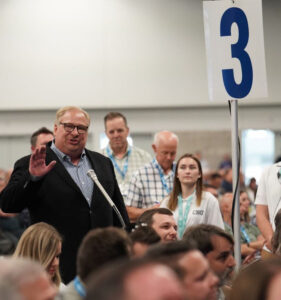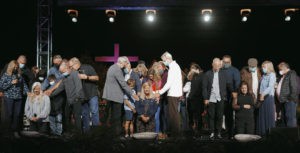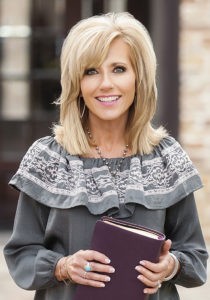Sixty years ago, Baptists would have had little reason to debate the meaning of the word “pastor.” In those simpler days, “the pastor” was the primary staff leader of a congregation — the person who preached most Sundays and provided pastoral care and leadership to the flock.
Today, the nation’s largest non-Catholic denomination is being forced into a gnat-straining debate about the word “pastor” mainly for the purpose of determining what roles women may fill and what roles they may not.
And for the far-right segment of the Southern Baptist Convention — mainly the neo-Calvinists — this is a matter of life-and-death doctrine. It is a battle worth fighting and one they will not give ground on.
“The nation’s largest non-Catholic denomination is being forced into a gnat-straining debate about the word ‘pastor’ mainly for the purpose of determining what roles women may fill and what roles they may not.”
That was evidenced at the SBC’s June annual meeting in Anaheim, Calif., where the most hardline complementarians — those who believe God has created men and women for different roles in home and church, with men always the leaders — tried to remove the largest and best-known church in the convention. The sin of Saddleback Church and its Senior Pastor Rick Warren is ordaining three female staff members as pastors or ministers.
Warren showed up unexpectedly on the convention floor and gave an impassioned speech about his church’s commitment to the SBC and missions and evangelism and church planting. While Warren received a warm response from many in the room, his comments were met with ridicule by the SBC Calvinists who seek purity at all costs and immediately took to social media to criticize him and mock him.

Rick Warren addresses messengers to the SBC annual meeting. (Photo courtesy of The Baptist Paper)
The SBC Credentials Committee backtracked and asked for more time to study the matter, but the debate has not died down in the subsequent weeks. In fact, the pressure campaign advanced by the staunchest complementarians — who also happen to be the same people who believe the SBC is sliding into “woke” liberalism on multiple fronts — caused three denominational leaders to issue a joint statement July 29.
Mohler, Kelley and Land speak
Al Mohler, president of Southern Baptist Theological Seminary; Chuck Kelley, former president of New Orleans Baptist Theological Seminary; and Richard Land, former president of the SBC Ethics and Religious Liberty Commission signed the statement recounting their understanding of how the word “pastor” was intended to be used in the Baptist Faith and Message 2000.
All three were members of the blue-ribbon committee that drafted the 2000 update to the SBC’s doctrinal statement and later jointly authored a commentary and study guide interpreting the faith statement.
In Article VI on “The Church,” the Baptist Faith and Message states: “Its scriptural officers are pastors and deacons. While both men and women are gifted for service in the church, the office of pastor is limited to men as qualified by Scripture.”
“Both the major groups that splintered from the SBC in that period — the Alliance of Baptists and the Cooperative Baptist Fellowship — made support for women in ministry key aspects of their identity.”
Codifying this belief about a male-only pastorate was important at the time because it had been a hallmark of the “conservative resurgence” of the 1980s and ’90s. Both the major groups that splintered from the SBC in that period — the Alliance of Baptists and the Cooperative Baptist Fellowship — made support for women in ministry key aspects of their identity.
The three men wrote: “As background, it is important to know that the committee sought to identify the one word about the pastoral role that Southern Baptists would best understand. As Dr. (Adrian) Rogers stated and the committee concurred, the one word that virtually all Southern Baptists understand is the word pastor. The language means that a pastor is one who fulfills the pastoral office and carries out the pastor’s functions. Thus, the statement means simply what it states, that the office of pastor is to be held only by men as qualified by Scripture. In the Baptist understanding, office and function are inseparable.
“As we wrote in the commentary on the BF&M, ‘Central to the pastor’s role is the responsibility to preach and teach.’ Pastors also provide spiritual leadership and oversight for the congregation. Again, it is important to understand that the word pastor was chosen precisely because of its clarity among Southern Baptists. The statement carefully affirms that both men and women are gifted for service in the church, but the role of pastor is biblically defined and is to be held only by men as qualified by Scripture.”
Who’s a ‘pastor’?
And indeed there are no accusations of any current SBC church calling a woman as its senior pastor or lead pastor. All the accusations concern churches — like Saddleback — that have ordained or called women to pastoral roles other than senior pastor.
“All the accusations concern churches — like Saddleback — that have ordained or called women to pastoral roles other than senior pastor.”
Saddleback counts more than 24,000 members and lists 18 “campus pastors,” all of whom are male. The three women who were ordained in 2021 all are long-term staff members serving in specialized roles with children, youth and pastoral care.
Herein lies the semantic dilemma. In 1963, the last time the Baptist Faith and Message had been updated, few Baptist churches called anyone “pastor” except for the person who today would be called “senior pastor.” In fact, the term “senior pastor” did not exist. Almost universally, the primary staff leader of a Baptist church was called merely “pastor.”
Smaller churches employed no staff members other than the pastor, while mid-sized and larger churches most commonly hired leaders they called “minister” of something or another. There were “ministers of music” and “ministers of education” and “youth ministers.” Some churches called “associate pastors” who were seminary-trained men likely on the way to becoming a “pastor” somewhere else.
But sometime in the past 30 years — ironically, driven by the seeker-church model embodied by Saddleback and others — Baptist churches commonly switched from the term “minister of” to “pastor.” Thus, they employed “youth pastors” and “children’s pastors” and “administrative pastors” or “executive pastors.”

Ordination photo at Saddleback Church posted to the church’s Facebook page.
This change in nomenclature was gaining steam around the time the Baptist Faith and Message was updated in 2000 — yet the document did not address the distinction explicitly.
Mohler, Kelley and Land explain in their July 29 statement: “When the confession was adopted and revised in 2000, Dr. Rogers and the committee made clear that it does not speak to every job category and ministerial title within a local church. But it does specifically define what the Southern Baptist Convention means by pastor, and what we believe the Bible teaches. The word pastor should be reserved for those who fulfill a pastor’s function and office.”
BFM as litmus test?
Even so, the Baptist Faith and Message never was intended to demand total allegiance from all participating SBC churches, the three committee members said. “The Southern Baptist Convention has sole authority to determine how the BF&M is to be applied in its own work. Baptists believe that every local church is autonomous and has full authority over its work, but all Baptist associations, including the Southern Baptist Convention, have absolute authority to speak for themselves and to define their own membership.”
Historically, the SBC has not removed churches from membership for ordaining women as pastors — some SBC churches in good standing do ordain women as deacons, but that is rare. However, the SBC in recent years has removed churches from membership for welcoming LGBTQ persons into membership and for harboring known sexual predators as staff members.
Almost all the expulsions of churches for ordaining or calling women as deacons or pastors have happened at the associational or state levels. In Baptist life, associations are bodies of churches in a smaller geographic area, such as a city or county.
A larger battle brewing
The current battle over the role of women in church leadership is part of a larger battle for control of the denomination that pits ultra-conservative Calvinists against more institutionally loyal traditionalists. In the past three years, the traditionalists have fended off efforts by the ultra-conservatives to be elected to key leadership posts.

Beth Moore
The specific contest over the role of women in SBC life is what drove popular Bible study teacher and author Beth Moore to leave the SBC last year and become an Anglican. Moore was widely accepted within the SBC so long as she identified as a “teacher” and not a “preacher” and so long as her primary audience was women and not men. However, when she was given a pulpit on Sunday morning and “preached” a sermon, that was too much for the conservative watchdogs.
Despite the SBC’s ban on women serving as pastors, some of the denomination’s most influential churches have featured women as Bible teachers for decades. The most notable example was Betty Criswell, wife of W.A. Criswell, longtime pastor of First Baptist Church of Dallas and a well-known biblical inerrantist. For decades, she taught a mixed-gender adult Sunday school class that was the largest Sunday morning Bible study on the campus and even aired on local radio.
Arlington, Texas, pastor Dwight McKissic pointed out the irony of that in a July 29 tweet: “Where was @albertmohler complaining about women teaching men, when Mrs. Criswell was teaching ‘The Pastor’s Class’ with up to 600 coed students, & to a radio audience of thousands? None of the current vocal opponents of R. Warren, opposed Mrs. C.; class larger than avg sbc ch.”
Related articles:
Largest church in SBC ordains three women as pastors
Why Beth Moore’s departure from the SBC really matters | Analysis by Mark Wingfield
Is the Beth Moore Effect a feminist awakening? | Analysis by Courtney Pace
Southern Baptists approve sexual abuse response and debate doctrinal parameters | Analysis by Mark Wingfield


